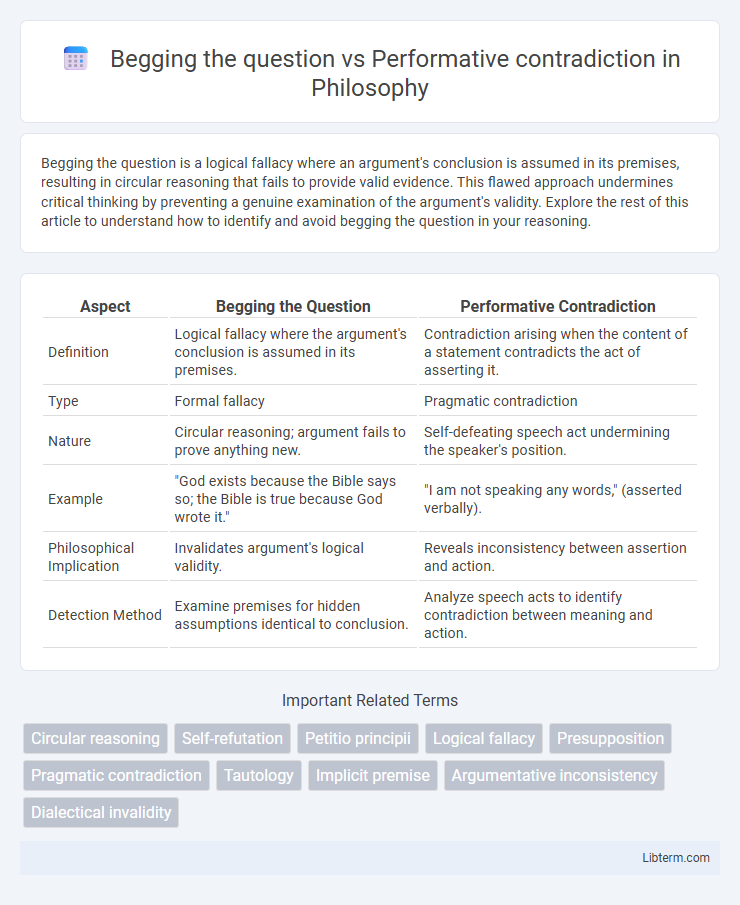Begging the question is a logical fallacy where an argument's conclusion is assumed in its premises, resulting in circular reasoning that fails to provide valid evidence. This flawed approach undermines critical thinking by preventing a genuine examination of the argument's validity. Explore the rest of this article to understand how to identify and avoid begging the question in your reasoning.
Table of Comparison
| Aspect | Begging the Question | Performative Contradiction |
|---|---|---|
| Definition | Logical fallacy where the argument's conclusion is assumed in its premises. | Contradiction arising when the content of a statement contradicts the act of asserting it. |
| Type | Formal fallacy | Pragmatic contradiction |
| Nature | Circular reasoning; argument fails to prove anything new. | Self-defeating speech act undermining the speaker's position. |
| Example | "God exists because the Bible says so; the Bible is true because God wrote it." | "I am not speaking any words," (asserted verbally). |
| Philosophical Implication | Invalidates argument's logical validity. | Reveals inconsistency between assertion and action. |
| Detection Method | Examine premises for hidden assumptions identical to conclusion. | Analyze speech acts to identify contradiction between meaning and action. |
Understanding Logical Fallacies: An Overview
Begging the question occurs when an argument's premise assumes the truth of the conclusion, causing circular reasoning that fails to provide valid support. Performative contradiction arises when the act of asserting a statement contradicts the content of the statement itself, undermining its logical coherence. Understanding these logical fallacies helps in evaluating the validity and soundness of arguments by identifying errors that distort rational discourse.
What Is Begging the Question?
Begging the question is a logical fallacy where the argument's conclusion is assumed in its premises, creating a circular reasoning loop that lacks independent support. It occurs when the proof of a statement relies on the truth of the statement itself, failing to provide valid evidence. This fallacy contrasts with performative contradiction, which arises when a statement contradicts the act of asserting it, rather than the content of the argument.
Examples of Begging the Question
Examples of begging the question include statements like "Reading is beneficial because it is good for you" or "God exists because the Bible says so, and the Bible is true because God wrote it." These examples illustrate circular reasoning where the conclusion is assumed within the premise, preventing logical progression. Performative contradiction differs as it occurs when the act of making a statement contradicts the statement itself, while begging the question centers on flawed argument structure.
What Is a Performative Contradiction?
A performative contradiction occurs when the content of a statement conflicts with the act of making the statement itself, revealing an inherent inconsistency. Unlike begging the question, which assumes the conclusion within its premises, a performative contradiction invalidates the speaker's position by undermining the very act of assertion. Understanding performative contradictions is crucial in philosophical debates and logical analysis to identify claims that self-defeat through their own performance.
Common Cases of Performative Contradiction
Common cases of performative contradiction occur when an individual asserts a claim that inherently contradicts the act of making the assertion itself, such as denying the possibility of truth while simultaneously claiming a truth. Begging the question involves circular reasoning where the conclusion is assumed in the premise, whereas performative contradiction exposes logical inconsistency between one's statement and actions. Examples include arguing that communication is impossible while engaging in communication or denying knowledge while requesting information, highlighting the self-defeating nature of the assertion.
Key Differences Between Begging the Question and Performative Contradiction
Begging the question is a logical fallacy where the conclusion is assumed in the premise, creating circular reasoning that fails to provide independent support for the argument. Performative contradiction occurs when a statement's content contradicts the act of asserting it, revealing inconsistency between what is said and the act of saying it. The key difference lies in begging the question's faulty logical structure versus performative contradiction's clash between assertion and proposition.
Why Distinguishing These Fallacies Matters
Distinguishing begging the question from performative contradiction is crucial for clear critical thinking and argument evaluation. Begging the question involves circular reasoning where the conclusion is assumed in the premise, undermining logical validity, whereas a performative contradiction occurs when the act of making a statement contradicts the statement's content, revealing inconsistency in practice. Recognizing these differences improves the accuracy of identifying flawed arguments and enhances philosophical and rhetorical analysis.
How to Identify Begging the Question in Arguments
Begging the question occurs when an argument's conclusion is assumed within its premises, creating a circular reasoning loop that fails to provide independent support. To identify begging the question, look for premises that restate the conclusion using synonymous terms without introducing new evidence or justification. Distinguishing this fallacy from a performative contradiction involves recognizing that begging the question hinges on logical structure, whereas a performative contradiction arises when the act of asserting conflicts with the content of the assertion itself.
Spotting Performative Contradictions in Discourse
Spotting performative contradictions in discourse involves identifying instances where a speaker's actions or statements inherently conflict with the content or presuppositions of their claim, undermining their argument's validity. Unlike begging the question, which assumes the conclusion within the premise, performative contradictions reveal a clash between the performative aspect of the speech act and its propositional content, often exposing inconsistency or self-refutation. Recognizing these contradictions requires careful analysis of both linguistic behavior and semantic context to reveal implicit conflicts that invalidate the discourse.
Practical Tips for Avoiding These Fallacies
To avoid begging the question, ensure your argument's premise provides independent support rather than assuming the conclusion is true, emphasizing clear evidence and logical progression. Recognize performative contradictions by aligning your statements with the conditions needed for their assertion, avoiding claims that undermine their own validity. Practice critical self-reflection and seek peer feedback to identify these fallacies and strengthen your reasoning skills in debates and writing.
Begging the question Infographic

 libterm.com
libterm.com